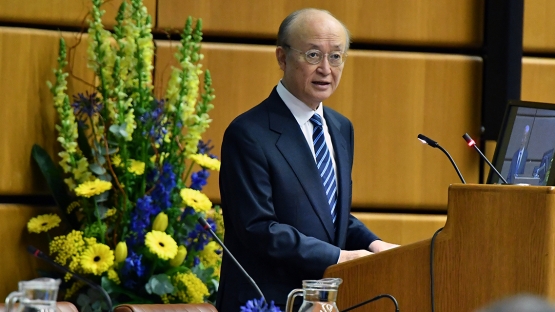(As prepared for delivery)
Good morning, Excellencies, Ladies and Gentlemen, dear Colleagues.
I am pleased to welcome you all to this IAEA event marking World Cancer Day 2019. The title of this event summarises the work of the Agency in this field in a nutshell: Boosting Capacity for Cancer Care.
Cancer killed nearly 10 million people around the world last year. That number is steadily increasing and developing countries are particularly hard hit.
For many years, the IAEA has worked to improve access to nuclear medicine – including diagnostic imaging – radiotherapy and dosimetry in developing countries.
The challenge is daunting: in 59 countries, less than a quarter of patients have access to radiotherapy. That means that huge numbers of people die of conditions that would often be treatable if their countries had the necessary equipment and facilities, and enough well-trained doctors and technical professionals.
However, we are seeing some improvements. If we compare data on access to radiotherapy from 2013 to 2018, things have got better in at least 20 countries.
Some of these countries benefited from IAEA support. Our focus is on transferring knowledge and expertise. We provided training to radiation oncologists, medical physicists, radiologists and other professionals. We also helped countries to acquire equipment.
You will hear some concrete examples of our work today: for example, how the IAEA helped Zambia to establish its first cancer treatment centre, and how Latin American oncologists have benefited from unique Masters courses in advanced radiotherapy.
We also help countries to ensure patient safety through quality control services. We have conducted over 13,500 dosimetry audits in the last 50 years, helping more than 2,300 institutions around the world ensure that patients receive exactly the right doses of radiation.
Those services will be enhanced in the next few months when we open a new Linear Accelerator facility at the IAEA Dosimetry Laboratory at Seibersdorf, near Vienna.
Ladies and Gentlemen,
For the past year, my senior staff and I have been reviewing the cancer services which we provide to developing countries and considering how we might improve them.
I will soon share our ideas with the Agency’s Board of Governors. But I can tell you that a unified approach, led by my office, will be implemented to ensure stronger coordination of the Agency’s cancer control related assistance to Member States.
The Division of Human Heath will continue to implement our cancer related activities, including coordinating research projects and developing training materials.
The Division of the Programme of Action for Cancer Therapy (PACT) will refocus its work in three main areas.
It will coordinate what we call imPACT review missions to identify a country’s cancer control needs and recommend appropriate action, and enhance its efforts to ensure that recommendations are acted upon.
It will help countries to establish Comprehensive National Cancer Control Plans.
PACT will work to raise additional resources for the IAEA’s cancer-related activities. It will also assist Member States in developing project proposals and so-called “bankable documents” that will help them to obtain funding from development banks and other financial institutions.
Our Division of Physical and Chemical Sciences will help countries to meet their needs for the radiopharmaceuticals used in nuclear medicine and radiotherapy.
The Department of Nuclear Safety and Security will help to ensure that safety and security issues are appropriately addressed in all cancer related programmes.
In all of these areas, we will work even more closely with key partners such as the World Health Organization and the International Agency for Research on Cancer.
Ladies and Gentlemen,
Let me conclude by thanking all of you for being here today.
Boosting capacity for cancer care in developing countries will remain a high priority for the IAEA, and for me personally, in the coming years.
Thank you.


